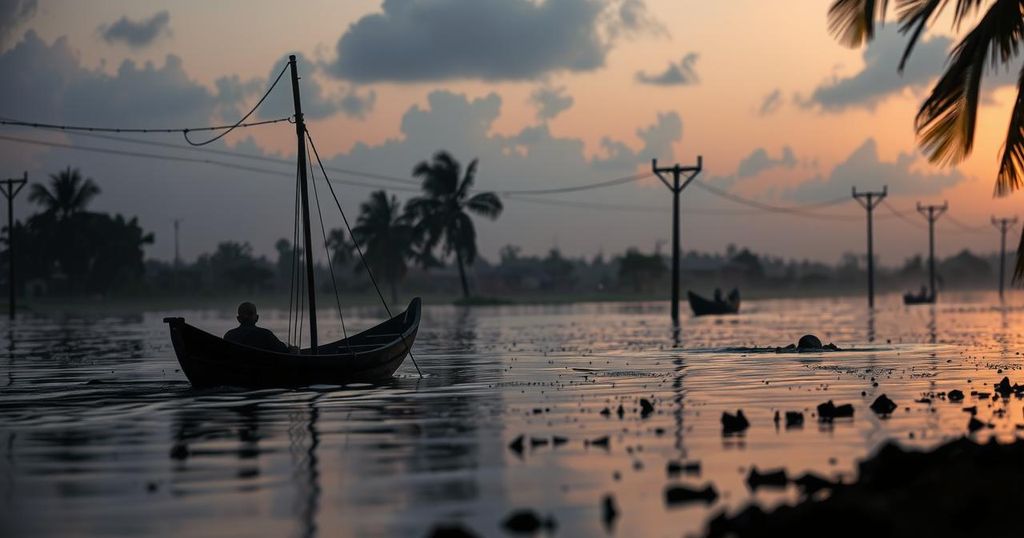Severe Flooding Crisis Impacting Chad, Nigeria, and Cameroon

Severe flooding across Chad, Nigeria, and Cameroon has impacted over 2.7 million people, leading to massive destruction of homes and agricultural land. The situation raises urgent concerns regarding food insecurity, with a call for substantial funding to assist those affected. Key regions include Chad, where over 500 have died, Nigeria, where extensive farmland has been damaged, and Cameroon, facing widespread devastation and potential waterborne illnesses. Organizations like Action Against Hunger emphasize the need for immediate humanitarian support and long-term adaptation strategies.
Recent extensive flooding has profoundly impacted millions in Chad, Nigeria, and Cameroon, with torrential rains resulting in extensive devastation. In total, over 2.7 million individuals have been affected, with 1.7 million in Chad, 1 million in Nigeria, and more than 230,000 in Cameroon. Homes and agricultural land have been submerged, prompting significant concerns regarding increasing food insecurity in these regions. Specifically in Chad, the rainfall began in late July and has continued unabated, wreaking havoc across several provinces including Lac, Mayo-Kebbi Est, Mandoul, Tandjilé, and Batah. The Sila province, which has received numerous refugees from Sudan, has also been severely impacted. The flooding has resulted in over 500 fatalities, the destruction of over 210,000 houses, and damage to more than 880,000 acres of farmland. This poses an alarming threat considering that approximately 3.4 million individuals in Chad are already suffering from acute food insecurity. The urgent need for an estimated $100 million in funding for humanitarian assistance has emerged, yet so far, only about 10% of this need has been met. In Nigeria, the states of Borno, Adamawa, Bauchi, Enugu, Jigawa, Kanu, Bayelsa, and Yobe have witnessed drastic flooding, leaving tens of thousands without shelter or food. Disconcertingly, prior to this catastrophe, over 32 million Nigerians were already facing severe food insecurity. Maiduguri, the capital of Borno state, was notably submerged, affecting approximately 414,000 individuals. The flooding has also devastated over 300,000 acres of farmland, amplifying food insecurity during the critical lean season. Cameroon is not spared, with 236,000 individuals affected by flooding, alongside the destruction of over 30,000 acres of crops. Rising concerns about waterborne diseases are prevalent, as critical infrastructure such as bridges and dykes have collapsed, prompting fears of mass displacements. The humanitarian response is urgent; agencies like Action Against Hunger are emphasizing the necessity for a comprehensive mobilization of resources to mitigate the immediate crisis, while simultaneously equipping affected families to adapt to future climatic challenges. In light of the increasing frequency of climatic shocks, the ongoing situation necessitates immediate intervention to safeguard the livelihoods of the most vulnerable populations across Chad, Nigeria, and Cameroon.
The flooding crisis across Chad, Nigeria, and Cameroon is emblematic of the broader challenges exacerbated by climate change, which has increasingly led to extreme weather events in these regions. These countries have faced severe vulnerabilities, with ongoing conflicts and humanitarian crises already straining resources. The repeated climatic shocks, including torrential rains, have not only caused immediate devastation in terms of loss of life and property but have also intensified existing food insecurity and displacement issues. Familiarity with these systemic problems is essential in understanding the current emergency and the critical need for support and effective response strategies.
In conclusion, the severe flooding across Chad, Nigeria, and Cameroon has affected millions, resulting in critical humanitarian needs including food, clean water, shelter, and sanitation. The urgent call for funding and resources highlights the necessity for a robust emergency response to support those impacted and to address the long-term challenges posed by climate change. Action Against Hunger and other organizations are at the forefront of this response, working diligently to provide immediate relief while planning for future adaptations to ongoing climatic threats.
Original Source: www.actionagainsthunger.org







